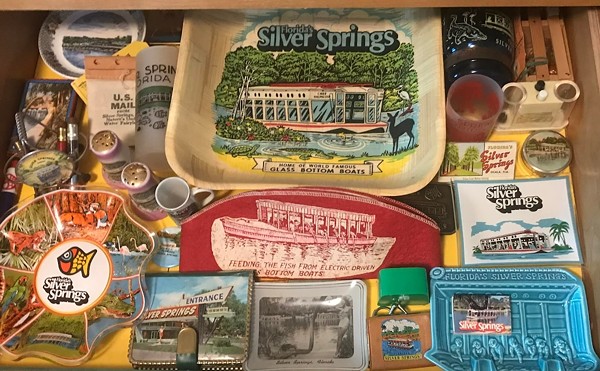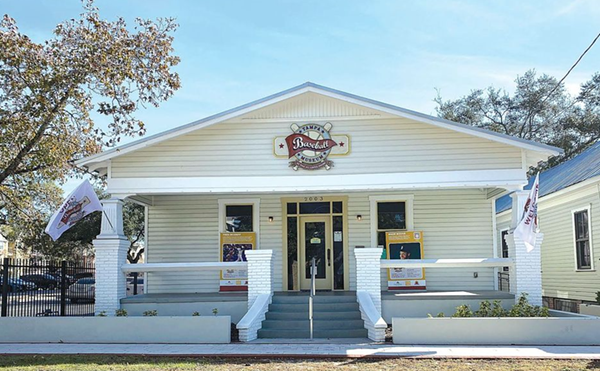Stanley Kowalski first appears on stage carrying a "red-stained package from a butcher's," which he throws to Stella before exiting (13). She cries in protest then laughs when she catches it. This opening glimpse into their domestic life provides a template for their relationship. Like a lion sharing his kill, Stanley tosses the fruits of his day's labor to his mate. His rough behavior gives Stella a fright but also a flash of pleasure. She may protest his unrefined habits, but she is ultimately drawn to them.
Blanche arrives on stage clearly out of place, wearing a fancy white dress and an expression of "shock and [image-1]disbelief" (15). Presumably, Blanche had a similar bewildered expression earlier at the transit station, hoping a stranger would tell her which streetcar to take. Eunice, the Kowalski's upstairs neighbor, asks if Blanche is lost. Blanche's first words also provide a summary of her situation: "They told me to take a street-car named Desire, and then transfer to one called Cemeteries and... get off at-Elysian Fields"(15). Her confined desires, limited to a track with a definite end, led her to "Cemeteries" and a kind of death. This in turn dumped her on "Elysian Fields," which alludes to the heavenly afterlife in Greek mythology. In contrast to Blanche's southern Christian sense of heaven, this "afterlife" is a kind of hedonistic paradise.
The production notes describe the setting in similarly contradictory terms. The street "has a raffish charm" (18). The sky around the diminished flats is a "peculiarly tender blue...which invests the scene with a kind of lyricism and gracefully attenuates the atmosphere of decay" (18). This is a kind of modern Eden for a rougher, more primal being. Joseph Riddel describes the street as a place "where life is pursued on a primitive level beyond or before good and evil" (16). This is true according to societal and religious understandings of good and evil. However, the place does have a definite code of ethics predicated by laws of nature. This is not to say that this play represents a reversion of a more primitive culture. Rather, this setting describes a modern society infused with naturalistic values. At the time the play was written, this new social order was forged in part by the lower classes climbing the social ladder in the wake of WWII, while many southern aristocrats fell from their social ranks. One of the play's main conflicts is the struggle between Blanche's Old South ideals and the more survivalist codes of violence, sex, and dominance in the New South of Williams' Streetcar.
As an exile from a more genteel lifestyle, Blanche instantly begins to criticize her sister, Stella's, life in Elysian Fields. Blanche is under the delusions that she is socially superior though she came to New Orleans with nothing but a few cents, a trunk full of costume gowns, and a bad reputation. This distorted self-image is affirmed when she tries to conceal her drinking from Stella. Everyone else in the play is open about their drinking as well as their other carnal behaviors such as sex and violence. At one point, Stanley even showers in beer foam. Blanche's want of alcohol is just one of many desires she tries to conceal, and which will eventually lead to her ruin.
Blanche greets her sister by criticizing Stella's weight, dirty dress, hair, and apartment, all while baiting Stella to complement Blanche's own beauty. Blanche is so obsessed with appearances that she does not allow anyone to see her in direct light. Her greatest fear is that men will stop finding her desirable, as she believes a woman's looks and charm are her only sources of power. Before Blanche even meets Stanley, she is worried that he will not like her, in which case she will have no power over him. Stella warns her that Stanley is "a different species" than the men they dated in their hometown of Laurel (24). While Stanley is different, it is unclear if Stanley is an evolved species, a modern Adam, or if he is simply one of the many varieties of life that inhabit the New South.
From the moment Stanley enters, throwing open the screen door, Williams is direct in describing Stanley as an animal of violence and sexual desire:
Animal joy in his being is implicit in all his movements and attitudes. Since earliest manhood [image-2]the center of his life has been pleasure with women, the giving and taking of it, not with weak indulgence, dependently, but with the power and pride of a richly feathered male bird among hens... He sizes women up at a glance, with sexual classifications, crude images flashing into his mind and determining the way he smiles at them (29).
Stanley's unrefined persona immediately sets him in opposition with Blanche and her Old South ideals. Nancy Tischler believes Stanley sees Blanche as a challenge to his authority as an alpha male (51). Stanley does not have the education or charming wit that Blanche does, but he is highly observant and domineering. He immediately comments on the missing liquor Blanche steals and begins questioning her about her background. Understanding his power over women, he removes his shirt and makes a crude joke to test Blanche's reaction. From this first confrontation, the audience has difficulty choosing whom to sympathize with: a tragic liar who pretends to be prim and proper, or a beast of a man who is blunt, direct, and passionate. The conflict of the play "becomes an unconscious sexual battle between the two," as Blanche's "‘airs' are a defiance to [Stanley's] manhood [that] unconsciously dare him to conquer her" (Sievers 139).
In the following scene Stanley questions Blanche about the family estate, Belle Reve, which Blanche claims was lost. She tries to diffuse his questions by flirting, spraying him with a puff of perfume and even fishing for compliments. Unlike the gentlemen she is used to swaying with her charm, Stanley is not distracted by such social fabrications as allure and elusive talk. This discrepancy in forms of attraction is demonstrated when Stanley mangles the yellowed love letters from Blanche's dead husband. He has spoiled the romantic ideals she grew up fantasizing about.
Blanche claims that Belle Reve was lost because the men of her family "exchanged the land for their epic fornications"(43). This physical embodiment of the Old South was lost because of reckless desire. For Blanche, love affairs and carnal pursuits are nothing new, but such desire has always come with a steep price.
Blanche gives weight to the idea that Stanley is the prototypical male of the modern era when she confesses to Stella that "maybe he's what [they] need to mix with [their] blood now that [they've] lost Belle Reve" (44). In order to survive, they must pair with dominating men who are more suited for surviving in this contemporary setting.
Around the poker table at the Kowalskis' sit "men at the peak of their physical manhood"(45). They are in their sexual prime and at the apex of their ability to assert their power. During the game, Stanley slaps Stella's thighs and she complains that "it makes [her] so mad when he does that in front of people" (48). Presumably, Stella enjoys when he strikes her in a sexual manner, but not in public. With an audience, this action is not a manifestation of sexual energy but a show of dominance. Stanley's dominating personality and physique are part of what intrigues Stella. She believes Stanley is the only one of the poker bunch likely to get anywhere because of these traits. He will not get climb the social ranks because of his intelligence or even his wit, the marks of successful Old South gentlemen, but what Stella calls "drive" (50).
Blanche tests Stanley's position as alpha male by repeatedly turning on the radio during the card game. He [image-3]meets Stella's resistance by throwing the radio out the window. "Drunk-drunk-animal thing you," Stella yells, directly challenging Stanley's authority. Stanley behaves as an alpha male, by charging her. When the women retreat upstairs, Stanley stands outside yelling to Stella "like a baying hound" (59). She answers his calls, and they come together with "low animal moans" (60). Stanley assumes a submissive posture, kneeling before her and resting his head on her stomach. With this act, Stanley submits to Stella's authority. Part of Stella's attraction to Stanley may stem from the thrill and power of being able to tame such a forceful man.
The exchange provides insight into Williams' view of sex and violence. It is widely reported that Williams participated in what would be termed "rough sex" (Tischler 53). In this practice, sex has much more to do with the exchange of power and submission than physical stimulation. This dynamic is not surprising considering that in the animal world, sex is often used as a way of asserting dominance and establishing social ranks. Understandably, fighting has become a form of foreplay for the Kowalskis. In order for them to experience heightened feelings of passion and arousal, they must first feel the painful lows of verbal and physical abuse.
The scene is echoed by a fight between the Kowalskis' upstairs' neighbors, Steve and Eunice. After a comical fight, the couple returns, consoling each other. Like Stanley and Stella's fight, passionate love is prefaced by aggression. Considering all the primal imagery Williams provides, one can interpret these relationships through the lens of animal mating. In the wild, sexual pairing is often characterized by violence. Mating often involves physical fighting between competing suitors, an aggressive pursuit, and a sexual exchange that would be more akin to our understanding of rape as opposed to romance. If the Kowalskis' relationship is animalistic, violence is a normal component of their union. In this carnal environment, it may even be considered advantageous for a female to mate with a male like Stanley, because he is capable of fighting off suitors and is passionate enough to chase after her.
In contrast to Stella, Blanche appears disheveled with worry the next morning as "she is violently repelled by [the Kowalskis'] contented animality" (Krutch 137). Stella claims that Stanley "was as good as a lamb when [she] came back" (63). This statement reinforces the notion that Stella enjoys the sexual power she has over Stanley. She was the lion to his lamb, or even his Sheppard. Her attraction does not only stem from being able to tame this man, but perhaps from being able to evoke his emotional outbursts. Stella admits that "Stanley always smashes things," and that she was even "sort of-thrilled" on their wedding night when he "rushed about the place smashing the light bulbs" (64). Blanche understands something of this dynamic, conceding that the "only way to live with such a man is to-go to bed with him"(69).
Ironically, Blanche thinks Stella is the delusional one for not realizing she is married to a madman. Stella fully realizes the kind of man she has married. His recklessness is part of his appeal. Although this kind of relationship goes against her upbringing, she is honest about her desires. "I'm not in anything I want to get out of," Stella continually tells Blanche who concocts a fantasy of getting money from an old lover for them to escape (65). Stella understands compromise. She is practical. She views Stanley's drinking, gambling, and violent outbursts as "his pleasure, like [hers] in movies and bridge" (65). She believes that people "have got to tolerate each other's habits" (65). Cleaning up after Stanley's violent spells is just a part of living with him. Unlike Blanche, she knows that life is no fairytale. Compromises must be reached. Stella is proof of the statement that "there are things that happen between a man and a woman in the dark-that sort of make everything else seem-unimportant"(70). She lives in a dilapidated house, full of smashed glass, in a noisy part of town, and yet she is satisfied.
Blanche understands the "brutal desire" that attracts Stella (70). She has ridden that rattle-trap street-car before, but "it brought [her] here.-Where [she's] not wanted and where [she's] ashamed to be" (70). It was not only desire that brought Blanche to this desperate end. The true conflict for Blanche is trying to maintain both her sexual desires and her Old South romantic ideals. In contract, Stella has found happiness by submitting to her desires, but she also had to abandon her childhood notions of aristocratic romance. Blanche is not yet prepared to make this sacrifice.
Pleading with Stella to leave Stanley, Blanche describes him as a "bestial" member of the Stone Age and begs Stella not to "hang back with the brutes" (72). Blanche fails to realize that while society may have advanced, humans' animalistic instincts have not evolved much. In the Kowalskis' world view, we are no more than tamed animals trained to abide by the laws of the modernized world. Socialization does not erase instincts, carnal desires, or brutal tendencies. Society has advanced, but the question remains if this change is a preferable one, and if animalistic tendencies have a place in this realm.
Blanche is appalled by Stella's bluntness in describing her sexual passion for Stanley, saying that "[w]hen he's away for a week [Stella] nearly [goes] wild" (25). Blanche pretends to be dumb to such feelings. Her primary delusion is that she is above Stella's situation. However, unlike Blanche, Stella has adapted to this new life successfully. "Stella has escaped the neuroticism to which her sister has fallen prey by completely accepting physical love with her husband," and all of that comes with it (Jones 114). Her allegiance to this grittier existence is confirmed when Stanley enters, greasy and sweaty, and Stella embraces him.
Blanche's true desires are reflected in her dissatisfaction with the failed suitor, Mitch. Blanche utters the now famous French line, "[v]oulez-vous coucher avec moi ce soir?" asking Mitch if he wants to sleep with her. Not only does he not speak this romantic language, he does not understand the language of desire or dating. Mitch "repeatedly projects an incomplete/interrupted sexuality in word and act" (Kolin 135). In many ways he is still a boy, living under his mother's protection. On poker nights, the other men emasculate Mitch, at one point even suggesting he saying he needs a "sugar-tit"(46). He is "neither man nor boy, caught somewhere in between, incomplete" (Kolin 135).
The couple returns from a teenager's date at a carnival with Mitch carrying and upside down Mae West statue won on a midway game. The fact that the statue of West, a sex symbol of the era, is upside down, may speak to Mitch's impotence as a suitor. Like teenagers, with no place of their own to retire after a date, they fuss over a goodnight kiss. "Why should you be so doubtful?" Blanche replies when Mitch asks for a kiss (87). She wants a confident man of action rather than one of words. Blanche guards her fantasy world when lying to Mitch about her age, weight, and the reason she came to New Orleans. She also makes sure that he never sees her in direct light. The only way she can manage reality is through the lens of fantasy and in the glow of soft stage lights.
Blanche allows her desires to show when she seductively kisses a paperboy who comes to the door. This is the one time she takes a proactive position in pursuing her desires. This scene echoes the kind of woman she was in Laurel, seducing army recruits, and having sexual trysts at the Flamingo. Most likely, her affinity for young men stems from her first husband Allan, who she always describes as a boy. Allan possessed "a nervousness, a softness and tenderness which wasn't like a man's" (95). He fit her idea of a romantic lover possibly because, like her, he was pretending to be in love. He mimicked ideas of a proper southern romance, going so far as to write her love letters and poems. Unfortunately, when Blanche discovered the boy in a room with an older man, she was forced to see that this perfect vision of love was a lie
Blanche returns to younger men, including a seventeen-year-old student, because like her young first husband, these men are naïve about romance. They are not jaded, but think of love in abstract terms that are closer to Blanche's magical ideas of a relationship. Perhaps this sexual innocence is what she appreciates in Mitch. However, she discerns the same conflict she had with her first husband: these naïve suitors are incapable of satisfying her sexual desires.
Mitch makes a kind of marriage proposal, telling Blanche that they need each other. This need is not the same kind of sexual need between the Kowalskis. Mitch needs her the same way Allan needed her. He is dependent on her. Like her relationship with Allan, Blanche's relationship with Mitch is doomed because they are both submissive people searching for strong partners.
Blanche's delusional ideals are embodied in the lyrics of a love song she sings: "it wouldn't be make-believe if you believe in me"(99). While she is floating in her imaginary world, Stanley tells Stella that Blanche was run out of a second class hotel in Laurel because of her sexual indiscretions. The local army base even forbid its soldiers from frequenting her house. Blanche admits that her love life consisted of running for protection "from under one leaky roof to another."
Her problem was that security was not enough. Blanche struggles with this paradox throughout; her primal desire for protection and sex cannot coexist with fantasies of romance and high society.
At Blanche's birthday dinner, Stanley smashes his plate to quiet the women who challenge his authority by calling him derogatory names. He sees Blanche as a threat, but he cannot dominate her sexually, at least in front of Stella. Stanley seemingly resents Blanche's presence and blames her for hurting the Kowalskis' relationship, which hinges on their sex life. With Blanche in the house, the Kowalskis cannot "make noise in the night the way that [they] used to" (109). They cannot reaffirm the bonds of their relationship through the intimacy of an unbridled sexual encounter. Stella is more compassionate than Stanley. She sees Blanche's delusions as society's fault. In her mind, Stella was a sweet innocent girl until people like Stanley "abused her, and forced her to change"(111).
In contrast to Blanche, Stella was eager to abandon her ideas of southern romance. Stanley asserts this point when he tells her how he "pulled [her] down off those columns and how [she] loved it" (112). Unlike Blanche, Stella found that she preferred this grittier existence driven by raw feelings, sensations, passion, and excitement, instead of the illusion of romance she grew up with.
In this play, the suppression of desire is a fatal flaw, as is the case with Allan. The death of Allan opened a floodgate of desire and fear for Blanche, which she could not manage. Blanche's sexual cravings, had been denied by her husband's homosexuality, were then blocked by her fear of spinsterhood (Leibman 29). More than anything, she dreaded becoming a spinster: the most dreaded social creature in the Old South (Jones 113). This panic "drove [her] from one to another, hunting for some protection"(117). As she no longer owned Belle Reve, which afforded her some social status, her only means of tempting suitors was through her sexuality and her fading looks. However, her sexual encounters quickly gained her a reputation that prevented many high class men, and even lower class suitors like Mitch, from marrying her. This rejection sent her into a downward spiral, as she succumbed "to crude sexuality because she [had] so fanatically refused to accept a normal life among people who appear[ed] to her as hopelessly unrefined" (Krutch 136).
Blanche again is forced to confront reality when Mitch questions her about her past and tears down the paper lantern to see her in plain light. The paper lantern represents Blanche's need to color reality in a softer light. Not only does the lantern help conceal her true age, it also lights the room as if it were a set in a romantic play. Blanche does not want realism-she wants to preserve the illusion of her youth and beauty. When Mitch tears down the lantern, he strips her of this illusion.
This confrontation forces Blanche's schizophrenic division between desire and romantic fantasies to a tipping point. Through these "sexual and concomitant mental idiosyncrasies, she has lost all contact with reality" (Jones 112). Blanche struggles to cope with sexual desires in a social setting, where obeying one's lust often has consequences she is unprepared to deal with. Blanche retreats from this confrontation by getting drunk, taking another bath, and putting on a soiled dress that Stanley describes as a cheap Mardi Gras costume. She speaks into the mirror, reliving the days on Belle Reve when she coaxed soldiers on moon-light swims. Even then she was obsessed with admirers seeing her in a soft, romantic light.
When Stanley returns after dropping Stella off at the hospital, no one is home to protect Blanche. The [image-4]production notes describe this primal scene as being filled with "inhuman voices like cries in a jungle" (128). Stanley confronts Blanche about her lies, pushing her into a hysteric state in which she breaks a bottle to wield as a weapon. This violence serves as a kind of foreplay. Sensing the challenge to his authority, Stanley asserts his dominance through sex. In his hands, Blanche becomes submissive, echoing the earlier scene when Stanley fell to his knees in Stella's arms. Stanley lifts Blanche's "inert figure and carries her to the bed," saying, "we've had this date with each other from the beginning!" (130). Most critics assume that what ensues is rape. If Elysian Fields parallels a more primitive, hedonistic world, this exchange may be closer to the natural consequence of two sexual beings forced to share the same space. Also, we do not know if Blanche resists during the act of sex. If she did not want a passive man like Mitch, it is conceivable that beneath her romantic illusions she craved someone like Stanley who would force himself on her. Even if she does resist, Blanche may behave so only in accordance with her southern ideals. Regardless, Blanche is forced to submit to her more carnal side and relinquish her illusion of the world as a prim and proper place. By subjecting her to this brutal reality, Stanley irrevocably conflates the two sides of her: the promiscuous woman and the southern belle.
In the final scene, Stanley proposes the idea that "to hold front position in this rat-race you've got to believe you are lucky" (131). In essence, you must take destiny into your own hands. Because Blanche is unable to do this, she suffers a psychological break. She is too passive, always searching for the protection of others. In the primitive world of Elysian Fields, nothing protects her from the will of dominant creatures like Stanley. She summarizes this character flaw in her exiting line as the doctor escorts her to the insane asylum: "I have always depended on the kindness of strangers" (142). While Stella cries watching her sister taken away, Stanley comforts his sobbing wife while "his fingers find the opening of her blouse" (142).
Some scholars, like Foster Hirsch describe the play's climax as "not merely the victory of a hard-hat over a coy Southern belle," but the "representation of Williams' conviction that ‘the meek shall not inherit the earth'" (4). Although Stanley is victorious over Blanche at the end, he is not necessarily a hero figure. While Williams does seem to believe that animalistic politics and sexual struggles do play a role in relationships, he does not necessarily advocate these as the best or only strategies for behaving. Rather, the play can be read as a warning against people like Blanche, who suppress their desires and ascribe to overly romanticized visions of what love should be. Not everyone would be happy sharing a flat with Stanley Kowalski, transitioning between violent fights and passionate sex. But, as evident with Blanche, we are likely to find only madness or dissatisfaction concealing our primal desires behind illusions of what is considered normal and proper.
Works Cited
Hirsch, Foster. A Portrait of the Artist: the Plays of Tennessee Williams. Port Washington: Kennikat Press, 1979.
Jones, Robert Emmet. "Tennessee Williams' Early Heroines." Two Modern American Tragedies: Reviews and Criticism of Death of a Salesman and a Streetcar Named Desire. Ed. John D. Hurrell. New York: Charles Scribner's Sons, 1961. 111-116.
Kolin, Philip C. "A Streetcar Named Desire." Tennessee Williams: A Guide to Research and Performance. Ed Philip C. Kolin. Westport: Greenwood Press, 1998. 51-79.
---. "The Family of Mitch: (Un)suitable Suitors in Tennessee Williams." Magical Muse: Millennial Essays on Tennessee Williams. Ed. Ralph F. Voss. Tuscaloosa: U of Alabama Press, 2002. 131-146.
Krutch, Joseph Wood. "‘Modernism' in Modern Drama." Two Modern American Tragedies: Reviews and Criticism of Death of a Salesman and a Streetcar Named Desire. Ed. John D. Hurrell. New York: Charles Scribner's Sons, 1961. 135-138.
Leibman, Nina C.. "Sexual Misdemeanor/Psychoanalytic Felony." Cinema Journal 26:2 (Winter 1987): 27-38.
Riddel, Jospeh N. "A Streetcar Named Desire-Nietzsche Descending." Modern Critical Views: Tennessee Williams. New York: Chelsea House Publishing, 1987. 13-22.
Sievers, W. David. "Tennessee Williams and Arthur Miller." Two Modern American Tragedies: Reviews and Criticism of Death of a Salesman and a Streetcar Named Desire. Ed. John D. Hurrell. New York:Charles Scribner's Sons, 1961. 139-145.
Tischler, Nancy M. "‘Tiger-Tiger!': Blanche's Rape on Screen." Magical Muse: Millennial Essays on Tennessee Williams. Ed. Ralph F. Voss. Tuscaloosa: U of Alabama Press, 2002. 50-69.
Williams, Tennessee. A Streetcar Named Desire. New York: Signet, 1975.
















